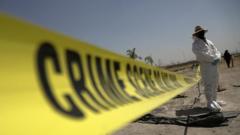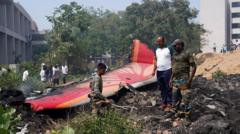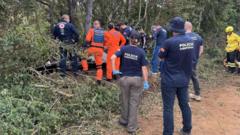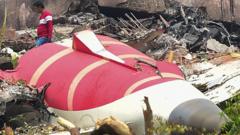As investigations into a suspected cartel training site continue, the mayor of Teuchitlán, José Murguía Santiago, has been arrested on charges of potential collusion with the notorious Jalisco New Generation Cartel. Activists and human rights organizations demand a thorough investigation into the site and the fate of missing individuals.
Mayor of Teuchitlán Arrested in Cartel Training Camp Investigation

Mayor of Teuchitlán Arrested in Cartel Training Camp Investigation
Allegations against José Murguía Santiago spark concerns over cartel collaboration and missing persons in Mexico.
Prosecutors in Mexico have apprehended Mayor José Murguía Santiago of Teuchitlán, located in the western Jalisco state, as part of an ongoing inquiry related to a cartel training camp discovered nearby. Authorities suspect the mayor's involvement with the Jalisco New Generation Cartel (CJNG), a notion he has publicly denied. This investigation gained momentum following shocking findings from March when activists searching for their missing relatives uncovered bone fragments along with numerous discarded shoes, backpacks, and clothing items at the Izaguirre ranch close to the town.
Human rights groups have expressed grave concerns that the ranch may have functioned as an "extermination camp," where individuals were forcibly recruited, trained, and those who resisted were subjected to severe torture or murder. The revelation of potential mass killings at the site has sent shockwaves throughout the nation, which has been grappling with rampant cartel-related violence for years.
In a recent press conference, Mexico's Attorney-General Alejandro Gertz provided an update on the investigation, asserting that the ranch was indeed utilized as a training facility for CJNG recruits, recognized for its influence in transnational drug trafficking. However, Gertz clarified that there was no evidence to suggest that the site had operated as a cremation or extermination venue. He noted that the bone fragments found were not recent and forensic evaluations indicated the fires lit at the ranch lacked sufficient heat for obliterating human remains.
The attorney-general's remarks generated frustration among relatives, referred to as "searchers," who are desperately trying to locate over 120,000 missing individuals in Mexico over the last 20 years. They criticized Gertz's explanations, stating they brought forth more questions than they addressed, particularly concerning the abandoned footwear found at the site and the whereabouts of their owners. Nonetheless, Gertz affirmed that the investigation would persist, including inquiries into possible ties between the CJNG and local officials.
Following his arrest, Mayor Murguía Santiago maintained his innocence, asserting a willingness to cooperate with the investigation. He had previously expressed confidence in his transparency, claiming, "If they want to investigate me, let them; I'm clean and willing to say what I know." Despite these declarations, prosecutors have alleged that Murguía Santiago was aware of the training center and failed to take any action on this intelligence. This incident underscores the ongoing challenges Mexico faces in its battle against cartel violence and corruption.
Human rights groups have expressed grave concerns that the ranch may have functioned as an "extermination camp," where individuals were forcibly recruited, trained, and those who resisted were subjected to severe torture or murder. The revelation of potential mass killings at the site has sent shockwaves throughout the nation, which has been grappling with rampant cartel-related violence for years.
In a recent press conference, Mexico's Attorney-General Alejandro Gertz provided an update on the investigation, asserting that the ranch was indeed utilized as a training facility for CJNG recruits, recognized for its influence in transnational drug trafficking. However, Gertz clarified that there was no evidence to suggest that the site had operated as a cremation or extermination venue. He noted that the bone fragments found were not recent and forensic evaluations indicated the fires lit at the ranch lacked sufficient heat for obliterating human remains.
The attorney-general's remarks generated frustration among relatives, referred to as "searchers," who are desperately trying to locate over 120,000 missing individuals in Mexico over the last 20 years. They criticized Gertz's explanations, stating they brought forth more questions than they addressed, particularly concerning the abandoned footwear found at the site and the whereabouts of their owners. Nonetheless, Gertz affirmed that the investigation would persist, including inquiries into possible ties between the CJNG and local officials.
Following his arrest, Mayor Murguía Santiago maintained his innocence, asserting a willingness to cooperate with the investigation. He had previously expressed confidence in his transparency, claiming, "If they want to investigate me, let them; I'm clean and willing to say what I know." Despite these declarations, prosecutors have alleged that Murguía Santiago was aware of the training center and failed to take any action on this intelligence. This incident underscores the ongoing challenges Mexico faces in its battle against cartel violence and corruption.






















